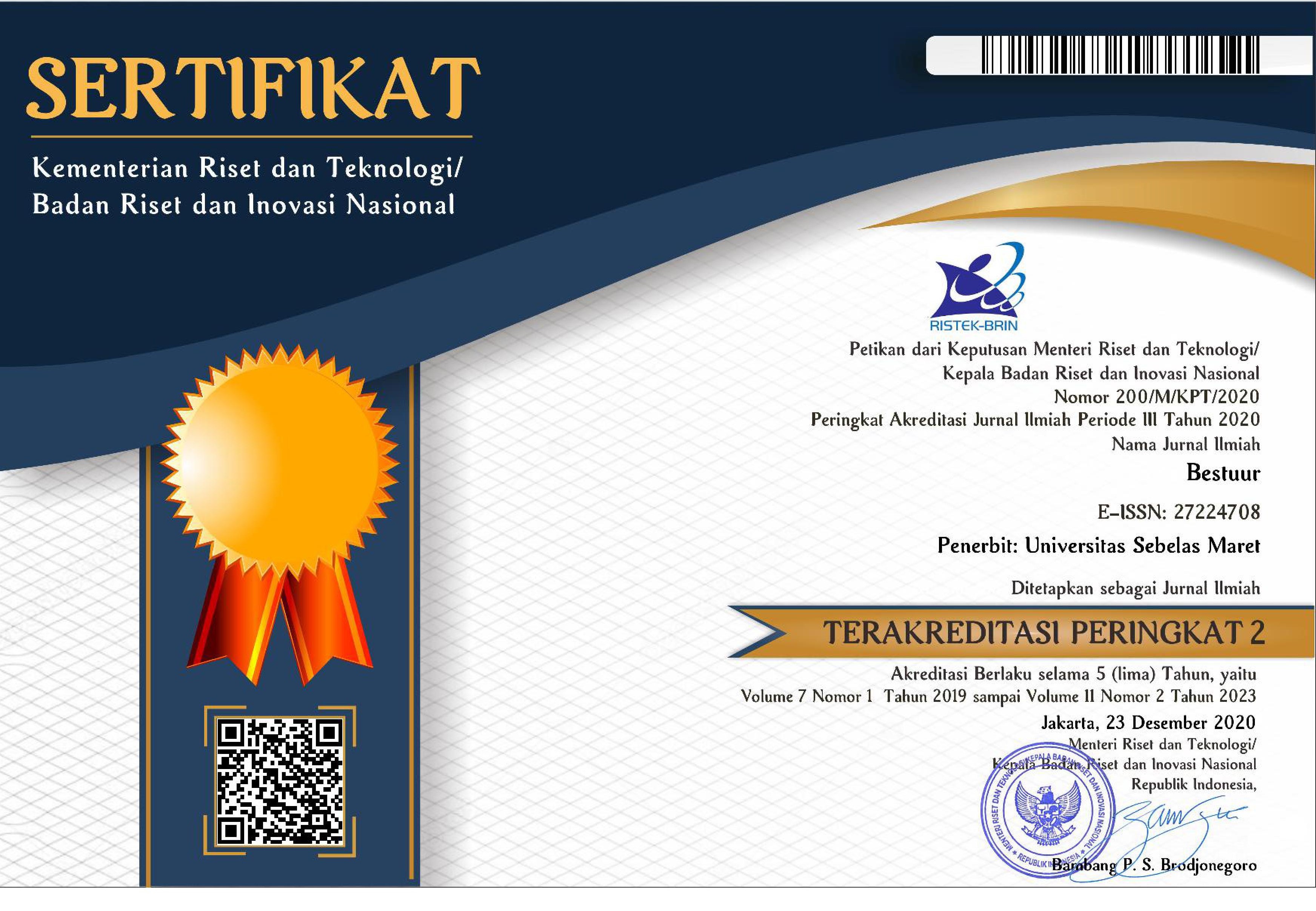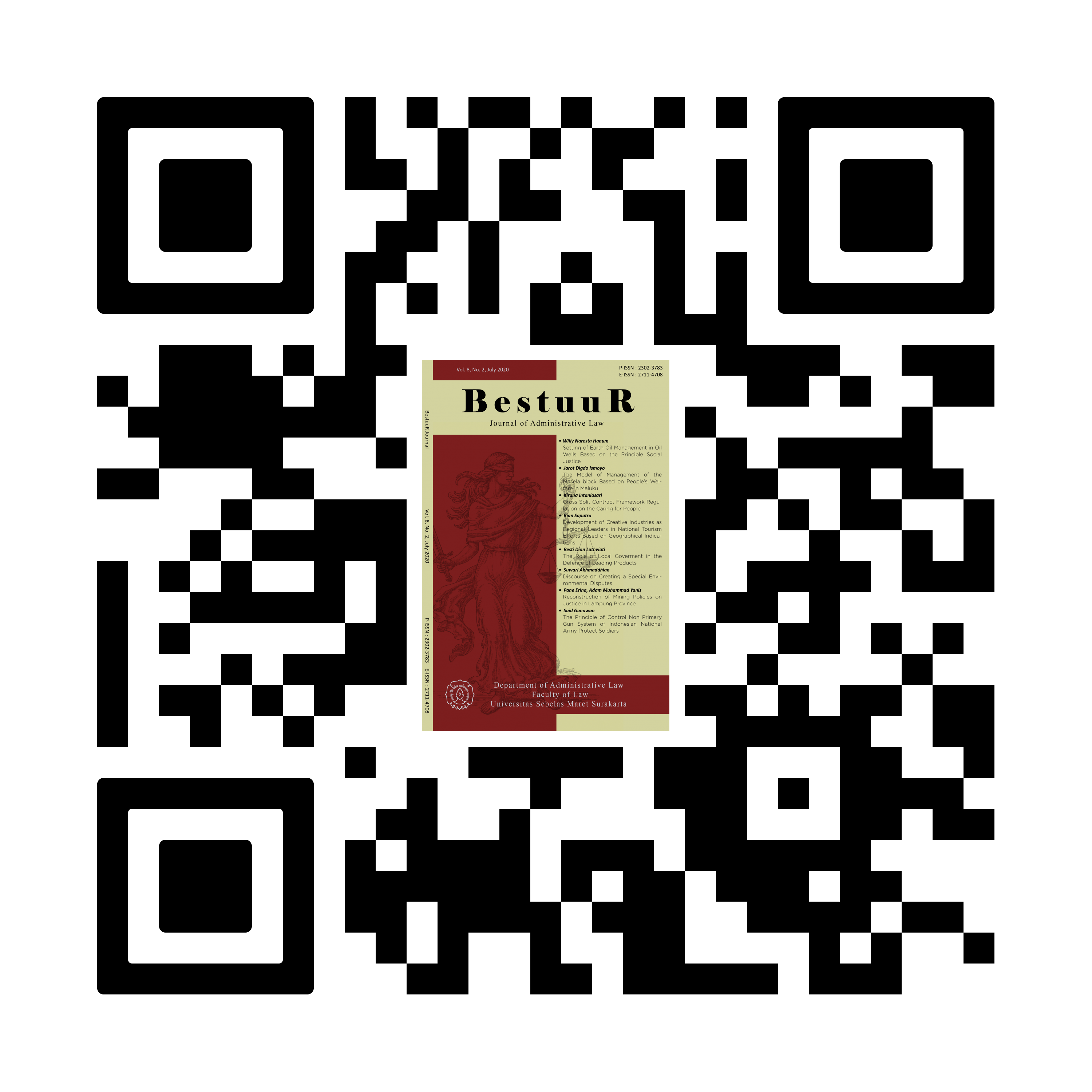Legislation Impediments in Reorganising Government Bodies in Indonesia
Abstract
Indonesia has implemented administrative reforms in a variety of areas, including reorganizing the structure of ministries and agencies. However, that effort has not yet yielded a significant outcome. The complex legal framework is believed to be primary challenge of this reform. This study aims to identify and analyze to what extent that the legislative constraints affect the reorganization attempt. This study applies qualitative approach. Data was collected through a desk-based study of legislations, policies, and secondary literatures related to bureaucracy reform in Indonesia, as well as its political and legal issues. The study's findings indicate that the government's sprawling and large structure is the result of overlapping function of laws and regulations. This hindered any efforts to reorganize. This further contributes to the administration's ineffectiveness and inefficiency. This study affirmed that legislation impedes the reorganization process because numerous laws have been used (improperly) to create a new ministry or agency rather than to reorganize.
Keywords
Full Text:
PDFReferences
Alfath, T. P., Pudjiastuti, L., & Sunyowati, D. (2019). The Legal Framework of Green Governance in Archipelagic State Based on Constitution of The Republic of Indonesia BT - Proceedings of the 3rd International Conference on Globalization of Law and Local Wisdom (ICGLOW 2019). 37–40. https://doi.org/10.2991/icglow-19.2019.9
Bozeman, B. (1993). A Theory Of Government “Red Tape.” Journal of Public Administration Research and Theory, 3(3), 273–304. https://doi.org/10.1093/oxfordjournals.jpart.a037171
Carausan, M. V. (2009). Institutional Uncertainties of the Rule of Law-The Public Prosecutor’s Office between the Executive and the Judiciary. Transylvanian Review of Administrative Sciences, 28, 104, available at: Google Scholar
Chua, L. J. (2014). Charting Socio-Legal Scholarship on Southeast Asia: Key Themes and Future Directions. Asian Journal of Comparative Law, 9, 5–27. https://doi.org/10.1017/S2194607800000910
Fukuoka, Y. (2012). Politics, Business and the State in Post-Soeharto Indonesia. In Contemporary Southeast Asia: A Journal of International and Strategic Affairs (Vol. 34, Issue 1, pp. 80–100). https://doi.org/10.1355/CS34-1D
Gans-Morse, J., Borges, M., Makarin, A., Mannah-Blankson, T., Nickow, A., & Zhang, D. (2018). Reducing bureaucratic corruption: Interdisciplinary perspectives on what works. World Development, 105, 171–188. https://doi.org/10.1016/j.worlddev.2017.12.015
Gil-Garcia, J. R., & Flores-Zúñiga, M. Á. (2020). Towards a comprehensive understanding of digital government success: Integrating implementation and adoption factors. Government Information Quarterly, 37(4), 101518. https://doi.org/10.1016/j.giq.2020.101518
Gu, Y., Wu, Y., Liu, J., Xu, M., & Zuo, T. (2020). Ecological civilization and government administrative system reform in China. Resources, Conservation and Recycling, 155, 104654. https://doi.org/10.1016/j.resconrec.2019.104654
Gulbrandsen, L. H., Inderberg, T. H. J., & Jevnaker, T. (2021). Is political steering gone with the wind? Administrative power and wind energy licensing practices in Norway. Energy Research & Social Science, 74, 101963. https://doi.org/10.1016/j.erss.2021.101963
Hadiz, V. R., & Robison, R. (2014). The Political Economy of Oligarchy and the Reorganization of Power in Indonesia: In M. Ford & T. B. Pepinsky (Eds.), Beyond Oligarchy: Wealth, Power, and Contemporary Indonesian Politics (pp. 35–56). Cornell University Press. https://doi.org/10.7591/9781501719158-005
Hammond, T. H., & Knott, J. H. (1996). Who Controls the Bureaucracy?: Presidential Power, Congressional Dominance, Legal Constraints, and Bureaucratic Autonomy in a Model of Multi-Institutional Policy-Making. The Journal of Law, Economics, and Organization, 12(1), 119–166. https://doi.org/10.1093/oxfordjournals.jleo.a023355
Harris, A. S., Sigman, R., Meyer-Sahling, J.-H., Mikkelsen, K. S., & Schuster, C. (2020). Oiling the bureaucracy? political spending, bureaucrats and the resource curse. World Development, 127, 104745. https://doi.org/10.1016/j.worlddev.2019.104745
Heper, M., & Sancar, M. S. (1998). Is Legal-Rational Bureaucracy a Prerequisite for a Rational-Productive Bureaucracy?: The Case of Turkey. Administration & Society, 30(2), 143–165. https://doi.org/10.1177/0095399798302002
Jones, P. J. S., & Long, S. D. (2021). Analysis and discussion of 28 recent marine protected area governance (MPAG) case studies: Challenges of decentralisation in the shadow of hierarchy. Marine Policy, 127, 104362. https://doi.org/10.1016/j.marpol.2020.104362
Jørgensen, T. B., & Bozeman, B. (2007). Public Values: An Inventory. Administration & Society, 39(3), 354–381. https://doi.org/10.1177/0095399707300703
Koike, O. (2013). Institutionalizing performance management in Asia: looking East or West? International Journal of Public Sector Management, 26(5), 347–360. https://doi.org/10.1108/IJPSM-05-2013-0066
Lim, G., Li, C., & Adi Syailendra, E. (2021). Why is it so hard to push Chinese railway projects in Southeast Asia? The role of domestic politics in Malaysia and Indonesia. World Development, 138, 105272. https://doi.org/10.1016/j.worlddev.2020.105272
Magdahl, J. E., & Jordhus-Lier, D. (2020). Labour internationalism and the public sector: The case of the Public Services International. Political Geography, 79, 102146. https://doi.org/10.1016/j.polgeo.2020.102146
Maulidia, M., Dargusch, P., Ashworth, P., & Ardiansyah, F. (2019). Rethinking renewable energy targets and electricity sector reform in Indonesia: A private sector perspective. Renewable and Sustainable Energy Reviews, 101, 231–247. https://doi.org/10.1016/j.rser.2018.11.005
Ministry of Menpan. (2014). Policy Paper: Restructuring the Structures of Bureaucracy – Recommendation on the Structure of Central Government using the Concept of Machinery of Government. available at: https://menpan.go.id
Ministry of Menpan. (2016). Pemetaaan Kelembagaan Lembaga Non-Struktural - Institutional Mapping of State Auxilary Agencies In Ministry of Administrative and Bureaucratic Reform. https://menpan.go.id
Pollitt, C., & Bouckaert, G. (2017). Public management reform: A comparative analysis-into the age of austerity. Oxford university press. available at: Google Scholar
Sarfo, J. O., & Ofori, P. K. (2017). A Book Review: Qualitative Inquiry & Research Design: Choosing Among Five Approaches. Russian Journal of Sociology, 3(1), 2015–2018. https://doi.org/10.13187/rjs.2017.1.30
Wang, H., Xiong, W., Wu, G., & Zhu, D. (2018). Public–private partnership in Public Administration discipline: a literature review. Public Management Review, 20(2), 293–316. https://doi.org/10.1080/14719037.2017.1313445
Warburton, E. (2016). Jokowi and the New Developmentalism. Bulletin of Indonesian Economic Studies, 52(3), 297–320. https://doi.org/10.1080/00074918.2016.1249262
Yazaki, Y. (2018). The effects of bureaucracy on political accountability and electoral selection. European Journal of Political Economy, 51, 57–68. https://doi.org/10.1016/j.ejpoleco.2017.03.009
DOI: https://doi.org/10.20961/bestuur.v9i1.51633
Refbacks
- There are currently no refbacks.
Copyright (c) 2021 Mas Pungky Hendra Wijaya, Mohammad Zulfikar Ali
License URL: https://creativecommons.org/licenses/by/4.0/
|











_CROSREF.jpg)




